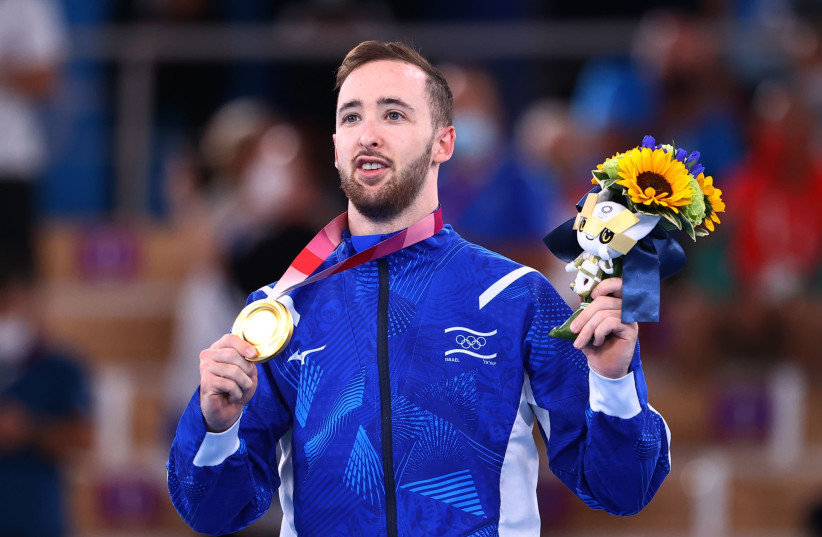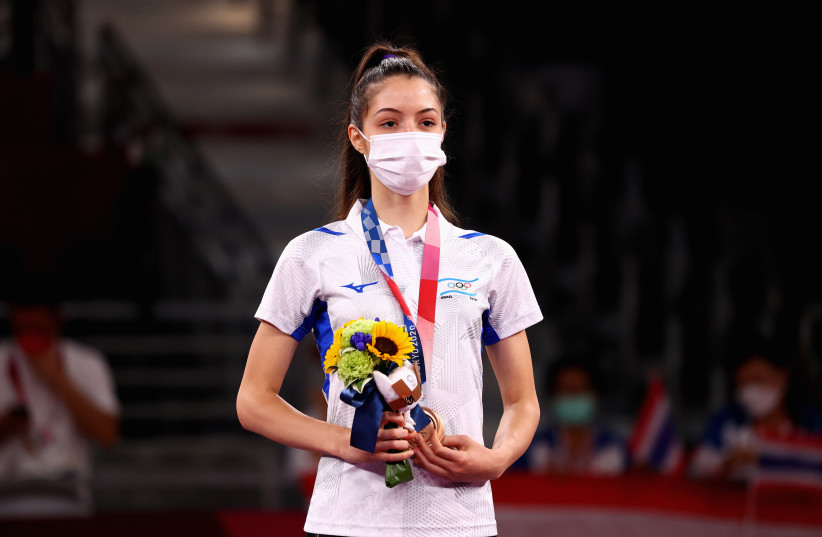It was with some trepidation that the 89 athletes in the Israeli Olympic team flew to compete in the Tokyo 2020 Games under the cloud of Covid, which had caused them to be delayed by a year.
There were some dramatic ups and downs during the Games in Japan, which many watched on television from July 23 to August 8, but by the time they ended, the Israeli team had lifted our spirits and at times, taken our breath away.
The four medals – golds for gymnasts Artem Dolgopyat (24) and Linoy Ashram (22), and bronzes for Team Israel in judo and Avishag Semberg (19) in taekwondo – set a new record for Israel.

Since the Jewish state began competing in the Olympics in 1952, it had won only seven medals, never more than two at one venue. Now that seven is 11!
Semberg started the ball rolling by bagging a bronze in the women’s 49 kg. category in taekwondo on the first full day of the Olympics. After a tough fight, she took the lead over Turkey’s Rukiye Yıldırım in the waning seconds, winning 27-22.
In a poignant moment after her victory, she ran to hug Yael Arad, the first Israeli to win an Olympic medal in judo at the 1992 Barcelona Games.
Semberg said of her accomplishment: “I said to myself, ‘I want this medal more than she does,’ and I did it: I have an Olympic medal at 19. It’s a dream come true!”

Although Israel’s top judokas failed to fulfill their promises of a medal, they came together in the mixed team event held for the first time to beat their Russian opponents in the battle for the bronze.
While Gili Sharir lost her bout, Sagi Muki, Raz Hershko, Timna Nelson-Levy and Peter Paltchik led Israel to a 4-1 victory and a place on the podium.
In an emotional moment in the individual judo competition, Iranian Saeid Mollaei, representing Mongolia, dedicated his silver medal in the men’s 81-kilogram division (Takanori Nagase of Japan won the gold) to Israel.
Two years ago, Mollaei left Iran, revealing that his coaches had ordered him to lose in the semifinals of the 2019 World Championships in Tokyo to avoid facing Israel’s Muki in the final. He developed a friendship with Muki, moved to Germany, became a Mongolian citizen, and competed in the Grand Slam judo competition held in Tel Aviv in February.
“Thank you to Israel for the good energy. This medal is dedicated also to Israel,” he told the Israeli Sports Channel after being presented his silver medal in Tokyo. “I hope the Israelis are happy with this win.”
“I’m super happy for Saeid,” Muki said. “I know what he’s gone through, and how much he wanted it. He’s a very close friend of mine, and I’m so happy that he succeeded in achieving his dream. He deserves it – his journey is incredibly inspiring.”
Politics came into play in Tokyo, too, and it was unfortunate that two judokas – Sudan’s Mohamed Abdalrasool and Algeria’s Fethi Nourine – withdrew to avoid facing Israel’s Tohar Butbul.
Still, it was encouraging to see Saudi judoka Tahani Alqahtani shaking hands with Israel’s Raz Hershko after being defeated.
The real highlights of the Games for Israel came in the gymnastics.
Artem Dolgopyat became the first Israeli to win a gold medal in gymnastics with an elegant performance in the men’s Floor Exercise.
Dolgopyat and Rayderley Zapata of Spain ended up with the same score of 14.933, but Dolgopyat performed a routine 0.100 higher in terms of difficulty, and as a result it was he who won the gold.
“My floor exercise was not the best; in the qualifiers I did better,” he said afterwards. “I was very stressed that it would not even be enough for a medal, but everyone was excited and made mistakes and that was enough for me and I am very happy.”
Dolgopyat was the second Israeli to win a gold at the Olympics. Windsurfer Gal Fridman bagged Israel’s first gold at the Athens 2004 Olympics after earning a bronze at the 1996 Atlanta Games.
Dolgopyat’s family was able to make aliyah under the Law of Return from Ukraine because his father is Jewish. His non-Jewish mother, Angela Bilan, sparked a widely covered news story when she told the 103FM radio station that her son could not marry his fiance because he was not halachically Jewish, and they would have to travel abroad to have a civil marriage.
“He has a girlfriend and they have lived together for three years, but he cannot get married,” she said.
Showing her ring, Maria Seikovitch, later told Channel 12 that although they were engaged last year, Artem “understood the rules of the game” when it came to Israeli marital laws.
Several cabinet ministers, including Alternate Prime Minister Yair Lapid and Labor leader Merav Michaeli vowed to take legal steps to enable Dolgopyat – and others in his situation – to marry in Israel. “It’s intolerable that someone can fight on our behalf in the Olympics, represent us and win a gold medal and not be able to get married in Israel,” Lapid said.
“Just like we broke the kosher certification monopoly, the time has come to end the monopoly of marriage in Israel,” added Michaeli.
The icing on the cake for Israel came when Ashram became the first Israeli woman to strike gold, winning the individual Rhythmic Gymnastics competition.
In a dazzling performance, she came out on top in the hoops with a score of 27.550, joint first in the ball routine with a score of 28.300, and a solid 28.650 in the clubs.
In her final routine, with “Hava Nagila” playing in the background, Ashram dropped her ribbon, but her score of 23.300 was sufficient to maintain her lead over Russian gymnast Dina Averina.
Ashram said that waiting for Averina’s score in the final routine was “the most stressful moment of my life.”
Averina, the silver medalist, claimed afterwards that she should have been declared the victor, and the Russian Olympic Committee protested the “injustice.”
Despite the Russian protest, Ashram was ecstatic. “I never imagined in my life that I would return with a medal, let alone a gold,” she said. “I always wanted to finish in the highest place possible, but I never dreamed that I would return from here as an Olympic champion!”
Israeli leaders, including President Isaac Herzog, Prime Minister Naftali Bennett and opposition leader Benjamin Netanyahu, called the Israeli medalists to congratulate them.
Bennett interrupted a cabinet meeting to phone Dolgopyat and thanked Ashram at the cabinet meeting on August 8 “for the pride and the joy that you have brought to the hearts of all of us.”
“It is possible to say that the Tokyo Olympics have been the most successful in Israel’s history. I was also moved when I heard – after Shabbat was over – about Linoy Ashram’s tremendous achievement. Linoy was not the only one with tears in her eyes when Hatikva was being played in Tokyo.”
Herzog told Ashram, “When we saw the tears in your eyes, the Israeli flag being raised, Hatikva being played and the gold medal on your neck – we were excited to the point of tears.”
Leaders of three religious parties scolded Netanyahu for calling Ashram and then issuing a statement about it on Shabbat.
“I am glad that the president and the prime minister waited until after Shabbat,” United Torah Judaism chairman Moshe Gafni said. “Mr. Netanyahu should have done the same.”
The Israeli team returned home from Tokyo to a hero’s welcome, raising hopes for the Paris Summer Olympics in 2024. “We’re not going to stop, we’re going to move forward with our focus on Paris and get ready for that and bring honor to the country,” Dolgopyat said.
Both he and Ashram will receive grants of NIS 500,000 ($155,000) from the Israeli Olympic Committee, and their coaches will receive half this amount.
The Culture and Sports Ministry announced that for the first time, government funding for sports would exceed a billion shekels ($310 million), while Culture and Sport Minister Chili Tropper promised to allocate NIS 802 million ($249 million) over the next two years to upgrade and build sports facilities across the country.
“I am proud of the men and women in the team not only because of their unprecedented achievements,” Tropper wrote in Hebrew in a Facebook post, “but because they served as models worthy of emulating for Israeli youth and children.”
Calling the team the most successful ever based on every professional parameter – from the number of medals to the number of finals for which they qualified and the number of sports in which they participated – Tropper added: “It was also the most successful in terms of its human composition and the special character of the sportsmen and women it comprised.”
Oleg Dolgopyat told Ynet that when his son won the gold, “My heart jumped; my body was on fire!”
Many Israelis – and no doubt many of Israel’s supporters around the world – felt the same way. Tokyo will be remembered forever as a high point in the history of Israeli sports – maybe the highest!■
